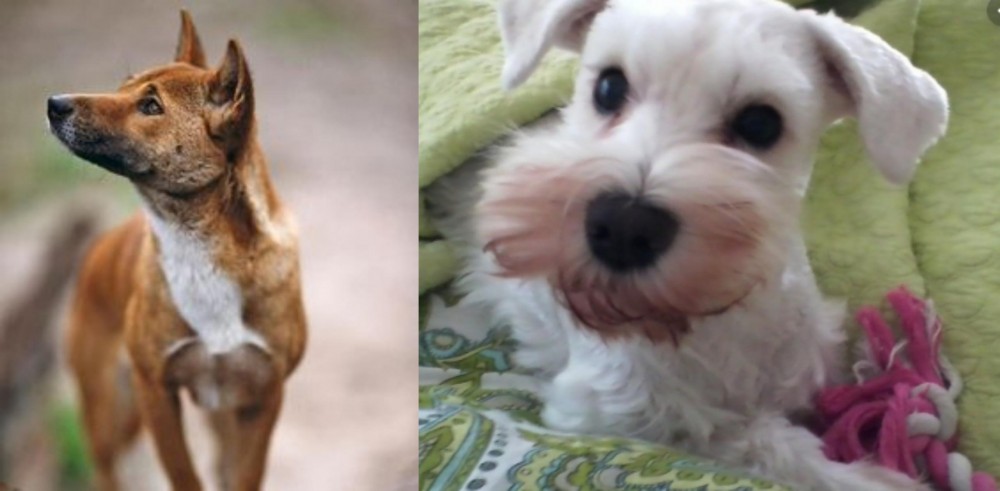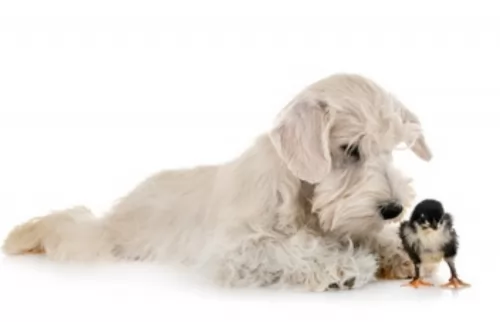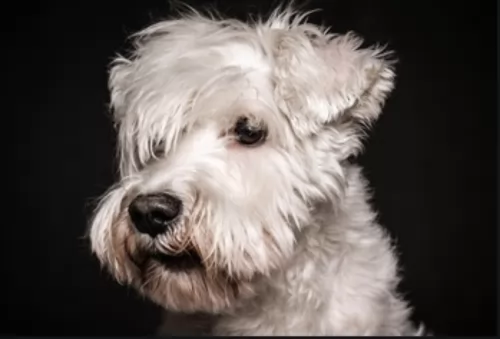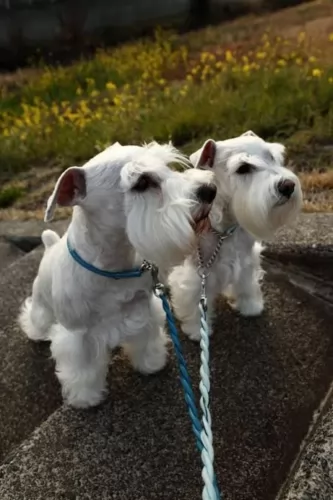 Petzlover
Petzlover New Guinea Singing Dog is originated from Papua New Guinea but White Schnauzer is originated from Germany. Both New Guinea Singing Dog and White Schnauzer are having almost same height. New Guinea Singing Dog may weigh 8 kg / 18 pounds more than White Schnauzer. New Guinea Singing Dog may live 6 years more than White Schnauzer. Both New Guinea Singing Dog and White Schnauzer has almost same litter size. Both New Guinea Singing Dog and White Schnauzer requires Moderate Maintenance.
New Guinea Singing Dog is originated from Papua New Guinea but White Schnauzer is originated from Germany. Both New Guinea Singing Dog and White Schnauzer are having almost same height. New Guinea Singing Dog may weigh 8 kg / 18 pounds more than White Schnauzer. New Guinea Singing Dog may live 6 years more than White Schnauzer. Both New Guinea Singing Dog and White Schnauzer has almost same litter size. Both New Guinea Singing Dog and White Schnauzer requires Moderate Maintenance.
 In 1957 the New Guinea Singing Dog was “discovered” in the Highlands of Papua New Guinea and he is found no where else. There is a lot of debate among scientists, taxonomists and biologist as to what is really a species and what is a subspecies. When the NGSD was found he was classified as a new canid species then in 2007 they were downgraded to a subspecies.
In 1957 the New Guinea Singing Dog was “discovered” in the Highlands of Papua New Guinea and he is found no where else. There is a lot of debate among scientists, taxonomists and biologist as to what is really a species and what is a subspecies. When the NGSD was found he was classified as a new canid species then in 2007 they were downgraded to a subspecies.
Today the NGSD is considered to be a wild dog and a primitive dog. They have lived in Papua New Guinea in the Highlands for thousands of years. They are closely related to other wild dogs, such as Australia’s dingo. They are today as they were a thousand years ago – wild. So wild that many counties have them in their zoos.
With the right care and enough socialization, they do very well as companion animals living with people. They are difficult to domesticate however and the person who owns one should be a part of the NGSD community in order to get support, share issues, and learn from others who have lived with these “wild dogs” for many years.
Any New Guinea Singing Dog found in North America or Europe is a direct descendent of two couples that were taken to zoos in China and Australia. The NGSD makes a howling sound that modulates and undulates through a wide series of tones. No other dog makes this musical sound. Rare even in New Guinea today, the Singer is thought to be the rarest of all dogs.
The only organization that recognizes the Singing Dog is the UKC and they are allowed in UKC competition. The NGSD now holds the classification of a domestic dog – a Canis lupus dingo - which is a subspecies of Canis lupus. In 2016 a group of 15 wild dogs were photographed for the first time ever. Prior to this the NGSD were never seen in more than pairs.
It is believed that they do not live and operate in packs, but rather solitary, pairs or family groups where both the parents do the work of raising the pups.
 The White Schnauzer was established in Germany in 2006 for people looking for this particular breed of dog but in white.
The White Schnauzer was established in Germany in 2006 for people looking for this particular breed of dog but in white.
The traditional color is salt and pepper. It seems that breed societies don’t allow the white breed, saying they don’t conform to the ideal breed standard.
The White Schnauzer is officially recognized in Germany, If you have a White Schnauzer you may not be able to show him with some of the major kennel clubs.
White is one of the four color varieties of the Miniature Schnauzer and it is also recognized by the Fédération Cynologique Internationale.
 The New Guinea Singing Dog is a medium sized dog with short legs and a broad head. They are about average height and they are very limber and flexible. They can rotate their paws and spread their legs at much greater angles than the average canine. Thus, they can easily climb a tree. They can jump like a cat.
The New Guinea Singing Dog is a medium sized dog with short legs and a broad head. They are about average height and they are very limber and flexible. They can rotate their paws and spread their legs at much greater angles than the average canine. Thus, they can easily climb a tree. They can jump like a cat.
They have very reflective eyes that are shaped like almonds and have dark rims. The color of the eye can be dark brown to dark amber. It is also believed that they can see better than other domestic dogs in low light settings. Their pupils let in more light due to pupils that are wider than most other dogs.
The ears of the NGSD are lined with fur, pointed and erect. The are forward laying and can be rotated in order to hear even the farthest and faintest of sounds. There are dark guard hairs on the spine and back of the ears and tail. On young dogs the muzzle is black but by age 7 it is already beginning to turn gray.
 There are a number of different types of White Schnauzer. The white Schnauzer is actually one of 4 color varieties and these dogs are always miniature Schnauzers.
There are a number of different types of White Schnauzer. The white Schnauzer is actually one of 4 color varieties and these dogs are always miniature Schnauzers.
You won’t easily find a Standard- or Giant dog in white. They aren’t albinos, as the skin does have some pigment.
These dogs also have that square-shaped build and they stand between 28 to 36 cm in height and weigh between 4 and 7kg.
The coat is wiry with a soft undercoat. The ears are often cropped to stand erect, but if left they are half-erect, half-floppy and fold forward.
The White Schnauzer is an intelligent dog who will be able to be socialized and trained easily.
He is an energetic little dog and very playful and will get along well with children, loving the games they provide and loving to spend time with all members of his family.
He is loving and affectionate and is willing to share his home and people with other dogs too. He will make you a good watchdog, perhaps encouraged because of his reserve with strangers.
If you provide him with the right amount of mental and physical stimulation, he can become a balanced dog with an amicable personality.
 They could be, but it must be remembered that this is a wild dog.
They could be, but it must be remembered that this is a wild dog.
Varying the pitches when howling
It’s possible but not recommended. Leave them wild.
Highly intelligent but trainability is questionable unless well socialize and attached to their people.
 The White Schnauzer is such an adaptable little dog and he will happily adapt to life in the city or in the countryside, just so long as he is close to his human companions and gets sufficient exercise.
The White Schnauzer is such an adaptable little dog and he will happily adapt to life in the city or in the countryside, just so long as he is close to his human companions and gets sufficient exercise.
He is a sociable dog that just loves to be around his human family and won’t like to be separated from them for too long.
He makes a great family dog when you provide him with the right food, a warm dry place to sleep, exercise and lots of love and attention.
 Though the breed is not extinct – it is so wild and secretive that there is no history or record of any health problems. However, the small number of domestic companion animals have shown health issues in recent years.
Though the breed is not extinct – it is so wild and secretive that there is no history or record of any health problems. However, the small number of domestic companion animals have shown health issues in recent years.
Pancreatitis – can be chronic or acute. If chronic it needs to be treated and diet changed. If acute it is usually deadly.
Hip Dysplasia – can cause lameness or arthritis.
 While he is a spunky, robust type of dog, there are always going to be some health concerns to look out for.
While he is a spunky, robust type of dog, there are always going to be some health concerns to look out for.
Kidney stones may well not cause your pet the same pain that humans endure, but they are still a cause for concern. A kidney stone that gets too large and lodges in the ureter becomes a ureterolith. This can be very painful, resulting in pain and even vomiting.
The kidney can even swell and become damaged. Your dog could become critically ill, particularly because of the disrupted flow of urine.
Your pet will possibly have blood in the urine, fever, lethargy, poor appetite and weight loss. Veterinary-intervention will be imperative.
 In the wild both pups and adults are thought to eat small mammals and birds as well as fruits. In homes feed a high protein diet. Because of the tendency toward pancreatitis do not feed raw or under cooked meat. If feeding meet do so in small amounts well cooked, very lean. Stay away from the fat. Feed puppies very small amounts. ¾-1 cup high quality dry puppy food twice a day.
In the wild both pups and adults are thought to eat small mammals and birds as well as fruits. In homes feed a high protein diet. Because of the tendency toward pancreatitis do not feed raw or under cooked meat. If feeding meet do so in small amounts well cooked, very lean. Stay away from the fat. Feed puppies very small amounts. ¾-1 cup high quality dry puppy food twice a day.
Same as the puppy when it comes to meat although you could give the adult a little more. 1 ½ cups od high quality medium breed dog food twice a day.
In the wild there is no indication of health issue. A very healthy breed.
The NGSD needs a lot of stimulation both mental and physical. They must have a daily walk and somewhere to run. They are escape artist in homes. Remember they can jump like cats and climb trees. If their head can pass through a hole, so can the rest of their body.
 He is a low shedding breed so he will require a brushing just once a week. These dogs also have a certain professional grooming cut. Some schnauzer dog owners do stripping but this is mostly for show dogs.
He is a low shedding breed so he will require a brushing just once a week. These dogs also have a certain professional grooming cut. Some schnauzer dog owners do stripping but this is mostly for show dogs.
Most people just have them sheared to make it easy to groom them. Whether stripped or clipped, they nearly always have a beard and bushy eyebrows.
Trim your pet's nails and give him a general once-over during the grooming sessions to ensure all is well.
You White Schnauzer relies on you to make wise food choices for him. He will eat most things you offer him. That doesn’t mean you should as you can cause him to have a whole lot of digestive problems.
If you choose to give him commercially manufactured dog food, make sure its a high-quality one – devoid of toxic ingredients such as colorants, fillers and preservatives.
If you don’t know how to choose, your vet can show you the foods they have in stock and which would suit your pet best.
A little bit of home-made food now and then can also be good, but the food needs to be plain and simple to avoid abdominal pain. Boiled chicken brown rice and vegetables chopped up and added to the dry kibble occasionally can be a very good choice.